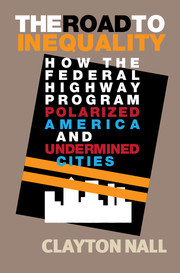Description
The Road to Inequality
How the Federal Highway Program Polarized America and Undermined Cities
Author: Nall Clayton
Shows how highways facilitated the sorting of Democrats and Republicans along urban-suburban lines, polarizing the politics of metropolitan development.
Language: English
Subject for The Road to Inequality:
Approximative price 102.81 €
In Print (Delivery period: 14 days).
Add to cart
The Road to Inequality
Publication date: 03-2018
186 p. · 15.6x23.5 cm · Hardback
Publication date: 03-2018
186 p. · 15.6x23.5 cm · Hardback
Approximative price 28.98 €
In Print (Delivery period: 14 days).
Add to cart
The Road to Inequality
Publication date: 03-2018
186 p. · 15.3x22.8 cm · Paperback
Publication date: 03-2018
186 p. · 15.3x22.8 cm · Paperback
Description
/li>Contents
/li>Biography
/li>
The Road to Inequality shows how policies that shape geographic space change our politics, focusing on the effects of the largest public works project in American history: the federal highway system. For decades, federally subsidized highways have selectively facilitated migration into fast-growing suburbs, producing an increasingly non-urban Republican electorate. This book examines the highway programs' policy origins at the national level and traces how these intersected with local politics and interests to facilitate complex, mutually-reinforcing processes that have shaped America's growing urban-suburban divide and, with it, the politics of metropolitan public investment. As Americans have become more polarized on urban-suburban lines, attitudes towards transportation policy - a once quintessentially 'local' and non-partisan policy area - are now themselves driven by partisanship, endangering investments in metropolitan programs that provide access to opportunity for millions of Americans.
1. Introduction; 2. How highways facilitate partisan geographic sorting; 3. Highways polarize metropolitan political geography; 4. Transportation becomes a partisan issue; 5. Implications for transportation policymaking; 6. Conclusion; Bibliography; Index.
Clayton Nall is Assistant Professor of Political Science and a faculty affiliate in the Urban Studies Program at Stanford University, California. His research has appeared in American Journal of Political Science, the Journal of Politics, Statistical Science, and The Lancet, and his work has been covered in The New York Times, The Washington Post, and The Atlantic. This book is based on research that won the Harvard Department of Government's Toppan Prize for the best political science dissertation and the APSA William Anderson Award for the best dissertation on federalism and state and local politics.
© 2024 LAVOISIER S.A.S.




